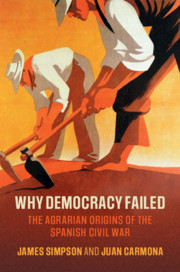Book contents
- Why Democracy Failed
- Cambridge Studies in Economic History
- Why Democracy Failed
- Copyright page
- Dedication
- Contents
- Figures
- Maps
- Tables
- Acknowledgements
- Notes on the Regional Division of Spain
- Abbreviations
- Introduction
- Part I The European Experience: Economic and Political Development, 1870–1939
- Part II Spanish Agriculture, Economic Development, and Democracy
- Part III Explaining the Weakness of the Family Farm
- Part IV Rural Elites, Poverty, and the Attempts at Land Reform
- Part V Rural Conflicts and the Polarization of Village Society
- 9 Creating Parties, Political Alliances, and Interest Groups: Rural Politics in the 1930s
- 10 The Growing Polarization of Rural Society during the Second Republic
- Conclusion
- Book part
- Glossary
- Bibliography
- Index
Conclusion
from Part V - Rural Conflicts and the Polarization of Village Society
Published online by Cambridge University Press: 17 April 2020
- Why Democracy Failed
- Cambridge Studies in Economic History
- Why Democracy Failed
- Copyright page
- Dedication
- Contents
- Figures
- Maps
- Tables
- Acknowledgements
- Notes on the Regional Division of Spain
- Abbreviations
- Introduction
- Part I The European Experience: Economic and Political Development, 1870–1939
- Part II Spanish Agriculture, Economic Development, and Democracy
- Part III Explaining the Weakness of the Family Farm
- Part IV Rural Elites, Poverty, and the Attempts at Land Reform
- Part V Rural Conflicts and the Polarization of Village Society
- 9 Creating Parties, Political Alliances, and Interest Groups: Rural Politics in the 1930s
- 10 The Growing Polarization of Rural Society during the Second Republic
- Conclusion
- Book part
- Glossary
- Bibliography
- Index
Summary
This book has argued that it was weak state capacity and the absence of competitive mass political parties that the Second Republic inherited which severely limited the possibilities of its success. As Juan Linz has noted, weak state capacity can create problems of efficacy, or the ability of governments to find adequate solutions to resolve basic demands, as well as a lack of effectiveness in policy implementation. Land reform is an excellent example because it failed to resolve the problems of the landless, leading to frustration among a large section of rural society, while providing a platform for an even larger group to organize against the Republic.
- Type
- Chapter
- Information
- Why Democracy FailedThe Agrarian Origins of the Spanish Civil War, pp. 247 - 253Publisher: Cambridge University PressPrint publication year: 2020

